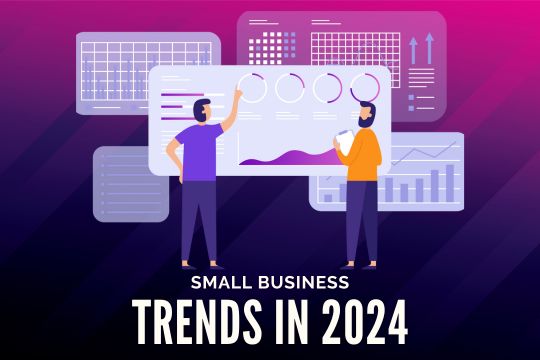
As we step into 2024, small business owners are navigating a landscape brimming with new opportunities and challenges, influenced by factors like rising interest rates and evolving consumer behaviors. Keeping an eye on emerging small business trends is critical for entrepreneurs to stay ahead and adapt. This article delves into the predominant small business trends in 2024, offering insights for small business owners to flourish in this dynamic environment.

AI, including generative AI and machine learning, has become a cornerstone in the evolution of small businesses. In 2024, the use of AI in small businesses is expected to surge, particularly in marketing, human resources, customer service, and logistics. The adoption of AI tools like ChatGPT has already shown a significant impact, enabling businesses to reduce manual errors, save time, and increase productivity and efficiency. Small businesses can gain a competitive edge by incorporating AI into their operations, such as through the use of chatbot vs live chat solutions.
AR and VR technologies are creating more immersive customer experiences, especially in sectors like retail, real estate, and hospitality. Businesses are predicted to leverage these technologies for innovative applications, like virtual try-ons or 360-degree property tours, enhancing customer engagement and satisfaction. This trend is particularly relevant for brick-and-mortar retail, offering a unique way to bridge the gap between physical and digital experiences.

Digital transformation continues to reshape the small business landscape. Building skills in digital marketing and analytics is becoming increasingly crucial. Small businesses are advised to invest in upskilling their teams and enhancing their online presence through optimized websites, active social media profiles, and mobile apps. This digital shift is not just about technology; it's about changing how you connect with your customers and build brand loyalty.
The shift towards remote and hybrid work models, catalyzed by the pandemic, is becoming a permanent fixture. This trend allows small businesses to access a global talent pool, reduce overhead costs, and offer round-the-clock services without geographical limitations. Emphasis on digital tools for business management and supply chain optimization is also growing, enhancing agility and adaptability.
A significant shift towards sustainability and ethics is observed among consumers. Small businesses focusing on environmental responsibility and ethical practices are likely to gain a competitive edge. This values-first approach is becoming a key differentiator in the market, contributing to long-term brand loyalty.
In a digital-first environment, business opportunities are no longer confined to a single geographic region; the door is figuratively open to international markets. Small businesses need to find unique niches, provide exceptional customer service, and adopt personalization strategies to stand out in the face of growing competition from both local and global players.
Modern customers prefer to lead their buying journey. Businesses need to adapt by offering more customized experiences, enabling customers to have greater control over their interactions with products and services. This includes employing customer education and resources to enhance the consumer experience.

Consumers are increasingly concerned about sustainability, with studies showing a clear preference for sustainable lifestyles and businesses. Additionally, cybersecurity is becoming crucial in a data-driven economy, where customers expect their information to be secure and responsibly managed. Proper data security and responsible data collection are essential to maintain trust and ensure compliance.
Small businesses in 2024 must also navigate the economic implications of elevated interest rates and Federal Reserve policies. These factors can affect everything from hiring employees to long-term financial planning, influencing how small businesses approach growth and investment strategies.
Navigating the Future with 2024's Small Business Trends
The small business trends in 2024 are characterized by a blend of technological advancements, such as artificial intelligence AI and AR/VR, and a strong emphasis on customer experience, digital proficiency, and ethical practices. By embracing these trends, including understanding the effects of rising interest rates and the importance of data security, small business owners can navigate the complexities of the current market, ensuring growth and sustainability.
Small businesses can access valuable business reports for further insights and resources to stay informed and adapt to these evolving trends. As we navigate these trends, it's important to remember that the landscape is ever-evolving, and staying informed is key to success in the world of small business trends in 2024.
Key technologies for 2024 are AI, machine learning, and AR/VR. They help automate tasks, personalize marketing, and create immersive shopping or property tours. Coupled with digital analytics and remote-work platforms, they form the core toolkit small firms need to stay competitive.
AI chatbots, predictive analytics, and smart HR tools cut manual errors, speed responses, and spot trends. This frees staff for higher-value work, reduces costs, and improves customer satisfaction, giving small businesses an agile edge against larger rivals.
Consumers increasingly reward companies that prioritize sustainability, fair labor, and ethical data use. A values-first approach builds trust, fosters loyal communities, and differentiates brands in crowded markets, often allowing small businesses to charge premium prices or attract mission-aligned talent.
Higher interest rates raise borrowing costs, making loans, credit lines, and equipment financing more expensive. Cash-flow planning becomes crucial, and growth projects may require larger down payments or slower rollouts. Monitoring Federal Reserve updates helps owners time investments and refine budgets.
Begin with a security audit, then adopt strong encryption, multi-factor authentication, and routine software updates. Collect only necessary data, be transparent about usage, and follow standards like GDPR or CCPA. Training employees on phishing and privacy goes a long way to protecting customer trust.